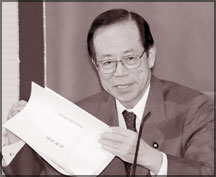Japan vows future emissions cut
Japan will aim to reduce greenhouse gas emissions by 60-80% by 2050.
Announcing the target, Prime Minister Yasuo Fukuda said Japan could
match the EU in cuts over the next 10 years, but did not set targets on
this timescale.
Fukuda also announced the setting up of a trial national carbon
market which could help establish a global scheme.
The news came ahead of next month's G8 summit in Japan, at which
heads of government aim to develop a position on future cuts in
greenhouse emissions.
|

Japanese PM Yasuo Fukuda |
Fukuda hopes to use the summit to build a consensus among the G8
countries which currently remain divided on how to approach the period
after the current Kyoto Protocol targets expire in 2012.
He was in no doubt that a united effort seeking major reductions was
needed.
"All nations of the world, including our own, must participate in
this effort to make it work," he said. However, he refrained from
setting short-term targets for national cuts, as the EU has done with
its commitment to reduce emissions by 20% from 1990 levels by 2020.
Fukuda said Japan could match the EU's ambition, and pledged to
announce a short-term target in the future. While it is committed to a
6% reduction in emissions from 1990 levels by 2008-2012 under the Kyoto
Protocol, recent data showed that in 2005 its emissions were 7.1% above
1990 levels.
Many environmentalists argue that long-term targets allow governments
to avoid taking the urgent action they believe is necessary.
National advancement
Fukuda also said the government would launch a trial carbon trading
system later this year. It will allow companies to buy and sell what
amount to "permits to pollute".
The European Union's version, the Emissions Trading Scheme (ETS), has
been in operation since 2005, and around the world there are a number of
stock exchanges which trade carbon outside the EU scheme.
Fukuda believes that Japan's participation could speed the
development of a global carbon market, which both the UN and the recent
Stern Review concluded must be a major component of any unified
worldwide attempt to reduce emissions.
The government is keen that hosting the G8 summit should advance
Japan's environmental credentials. It played a leading role in the
establishment and adoption of the Kyoto Protocol, agreed in the former
Imperial capital in 1997.
"We can bolster Japan's standing in international society and
strengthen our economy further by taking a leading role in the CO2
reduction revolution," said Fukuda.
But in recent months his government has aroused concern in some
environmental circles by pushing a concept of sectoral emissions cuts,
where targets would be set for different areas of the economy such as
steelmaking, transport or energy.
Further concern was aroused by the agreement reached at last year's
Asia-Pacific Economic Co-operation (Apec) forum in Sydney, where Japan,
the US and 19 other Pacific Rim countries agreed cuts based on "energy
intensity" rather than carbon emissions, and made voluntarily rather
than as part of an international package. Both ideas are seen by
sceptics as potentially opening doors through which countries and
companies could evade restrictions.
Loose bindings
The EU remains adamant - as do many developing countries - that any
post-2012 deal is made through the UN process and on a global basis. At
a UN climate convention meeting last year in Vienna, there was a good
deal of consensus around the idea that emissions should be cut by 25-40%
from 1990 levels by 2020, which fits in with recommendations from
scientists behind last year's Intergovernmental Panel on Climate Change
(IPCC) report.
More recently, the US administration said it would agree to binding
cuts if others did likewise.
The detail of their position means that major developing economies
would have to take on some kind of binding commitment. The
Democrat-controlled ongress has examined a number of pieces of
legislation aimed at curbing emissions.
But last week a bill that would have capped emissions from energy
plants and heavy industry was blocked in the Senate, with opponents -
mainly Republican - arguing it would wreak economic havoc.
The target for all of this activity is the UN climate summit at the
end of 2009, when negotiators hope to have the building-blocks in place
for a deal extending beyond 2012. Fukuda's speech suggests that Japan is
keen to achieve a deal that makes meaningful reductions in emissions.
But many important players in the US remain to be convinced; and the
much more difficult process of negotiating commitments from developing
countries has yet to begin in earnest.
-BBC |
